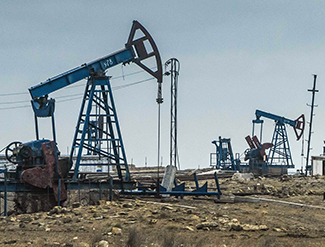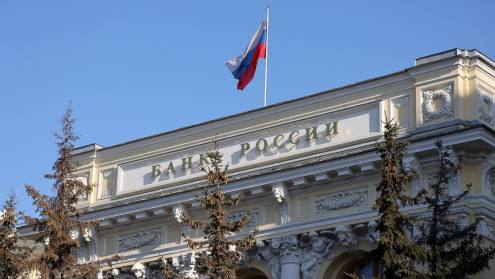Azerbaijan’s oil bounty has proved a blessing and a curse. ‘The contract of the century’ signed in Baku in 1994 – between the country's government and 11 foreign oil companies, led by BP, to develop a deep-water field in the Caspian Sea – unleashed rapid development. As Azerbaijan turned into a major energy supplier, its economy became one of the fastest growing in the world. Between 1995 and 2015, inflation-adjusted gross domestic product (GDP) growth increased by six times. In one of those years, Azerbaijan’s economy expanded a blistering 34.5%.
It was not to last. A steep plunge in global oil prices, from a peak of $115 per barrel in June 2014 to below $35 at the end of February 2016, led to a deep recession and, after nearly two decades of exchange rate stability, Azerbaijan was forced to devalue its currency, the manat, by 50%.
The devaluation fanned concerns about bank balance sheets and asset quality, and put pressure on deposits. In the eye of the storm was the country’s largest bank, the state-controlled International Bank of Azerbaijan (IBA), where an embezzlement scandal surfaced on top of a mountain of non-performing loans that had reached about 80% in 2015. IBA was spared bankruptcy by a government bailout, reckoned to have cost the equivalent of one-quarter of the country’s GDP.
Wake-up call
The oil price decline and manat devaluation exposed long-standing structural weaknesses in Azerbaijan, however. “Reliance on hydrocarbons and the rapid rate of growth led to a lack of reform. There was a lot of construction in the capital, but rural areas remained without basic infrastructure, and the oil sector crowded out the rest of the economy,” says Dimitar Bogov, regional lead economist for Ukraine, Moldova and the Caucasus at the European Bank for Reconstruction and Development (EBRD).
Mr Bogov calls the country's financial crisis of 2015 to 2017 “a wake-up call” for Azerbaijan’s ruling elite. “They found out that they are vulnerable. Before, they thought they were invincible. After the decline, they started looking at things differently, and have undertaken some reforms in the right direction.”
Authorities have streamlined customs management and the issuance of licences and permits, simplified visa procedures, placed a moratorium on inspections, set up agencies to support the non-oil private sector, and begun restructuring the shell-shocked banking industry.
The result has been a welcome jump in Azerbaijan’s place in the World Bank's Doing Business rankings, from 65th in 2016 to 25th in 2018. An increase in oil prices has helped the economy recover, with the GDP forecast to grow 3.5% in 2019, and business confidence has been boosted by initial deliveries from a large gas field in the Caspian Sea.
The ageing main oilfield, the giant Azeri-Chirag-Deepwater Gunashi (ACG) complex in the Azerbaijan sector of the Caspian Sea, accounts for about 75% of the country’s oil output. In just the first seven months of 2019, Sofaz, the state oil fund, received $5.16bn in royalties and other proceeds from ACG. The original production sharing agreement for the oilfield has been extended to 2049, and an additional $6bn is being invested in its exploitation in 2019, on top of the $36bn spent on it so far.
Stepping on the gas
Azerbaijan's natural gas revenue trails by a wide margin – from January to August 2019, income from the Shah Deniz gas field was only $209m – but with oil output forecast to start declining in about two decades, the contribution made by gas to the country's coffers is expected to overtake this.
Key to Azerbaijan’s energy future is the $45bn Southern Corridor project, aimed at reducing the EU’s energy dependency on Russia by piping Caspian gas through Azerbaijan, Georgia, Turkey, Greece and Albania, and across the Adriatic Sea to the heel of Italy. First deliveries in Italy from this ambitious undertaking are expected in 2020.
At the Azerbaijan end of the 3500 kilometre-long Southern Corridor pipeline is Shah Deniz. Discovered in 1999, it is one of the world’s largest gas-condensate fields, located on a deep-water shelf of the Caspian Sea some 70 kilometres south-east of Baku. The first development stage of Shah Deniz began operations in 2006 and now supplies 10 billion cubic metres per year of gas to Azerbaijan, Georgia and Turkey. The second stage adds a further 16 billion cubic metres per year and began delivery in 2018.
Hydrocarbon exports have enabled Azerbaijan to build up sizeable liquidity buffers. Sofaz assets had reached $42.46bn at the end of June 2019, and the central bank had $5.87bn in foreign exchange reserves in May. Together, this just about equals Azerbaijan’s GDP.
EBRD warnings
On the opposite side of the ledger, the EBRD decries the many negative effects from Azerbaijan's over-reliance on oil and gas, as well as glaring weaknesses in governance, administration, banking, education, transport and productivity. In its 2019 to 2024 strategy for Azerbaijan, the EBRD points to a lack of “accountable and effective institutions and transparent policy-making” in public governance, as well as “rule of law challenges” from an ineffective court system.
Taxation is “unpredictable” with tax administration in need of reform; corporate governance is marred by “shortcomings in the structure and functioning of boards, in transparency and disclosure standards, and in internal controls”; and investor confidence is undermined by perceptions of widespread corruption, the EBRD says.
Hans Krohn, Commerzbank's regional head of financial institutions for the Commonwealth of Independent States, applauds reforms intended to reduce bureaucracy and improve transparency, but questions “how quickly it will filter down to the real economy and lead to increased investment and an easing of doing business”.
Azerbaijan remains “a market struggling with an informal economy”, he adds. “It is still dominated by family clans. On the other hand, the government is tackling those issues, and it seems to be very serious about them.”












